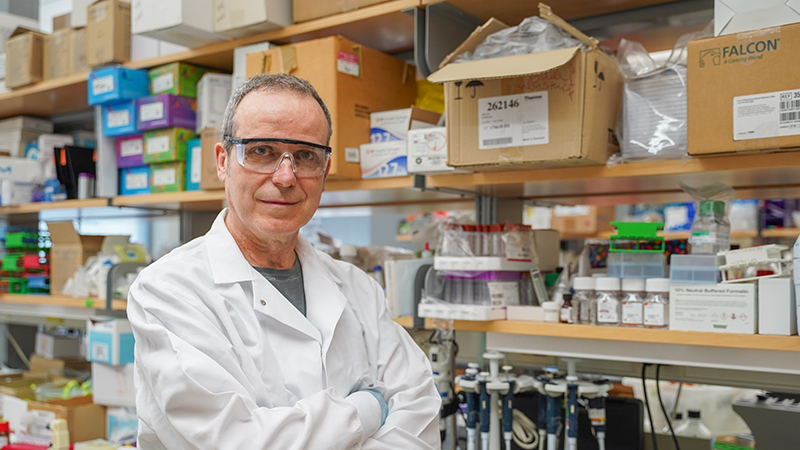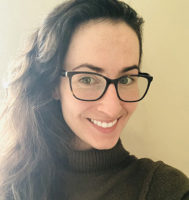
What began in 1997 as a two-year fellowship abroad supported by the Swiss National Science Foundation evolved into a long and prolific career as a scientist in the Department of Pediatrics for Marcel Wuethrich, PhD, distinguished scientist III in the Division of Infectious Diseases.
“I always tell people that I’m a biologist by education and heart. Since I was a kid, I was truly interested in anything living. I’m particularly interested in birds, insects, and butterflies,” Wuethrich explained. “I wanted my profession to be based on something I was motivated to learn.”
Wuethrich grew up in Switzerland and studied at the University of Bern. He knew if he studied birds, he would begin broadly with biology and then focus into a specialty like ethology or behavior of birds. But he knew he had to make a living, so instead, he started in microbiology and then specialized in biochemistry and molecular biology. With his PhD from the University of Bern, he began looking for jobs abroad in an English-speaking country, England or the United States.

Wuethrich interviewed at a UW–Madison laboratory and met Bruce Klein, MD, professor and chief of the Division of Infectious Diseases. He joined Klein’s lab in 1997 and worked as a postdoc with support from two Swiss grants. In 2000, he was hired as a staff scientist.
When Wuethrich arrived at the lab, Klein had already been investigating Blastomyces dermatitidis, a pathogenic fungus that is a primary human pathogen, since the mid-1980s. The Klein Research Group focuses on two broad areas: fungal pathogenesis and immunology. Wuethrich has joined Klein in many investigations with Blastomyces dermatitidis serving as a model for other pathogenic dimorphic (existing in two forms in its life cycle) fungi, such as Histoplasma capsulatum, Coccidiodes immitis (“Valley fever”) and others. Wuethrich noted that since 2007 he has been the PI on a number of NIH R21 and R01 research projects. Klein encourages him to take the role of PI on some of the works that he has initiated or developed, even though he does not have faculty status.
“I really enjoy having the leadership and responsibility of what happens with a project, having the bird’s eye view of what’s going on. You are the one who hires, who signs off on the publications,” he said. “I work on many different projects in the lab — sometimes where Bruce is the PI and I am another eye looking in on it. We have a collegial arrangement working together. It makes my work more interesting, and I am certainly very appreciative that I can serve in that capacity. If people on the team are happy, then the work will progress.”
Wuethrich described another important aspect of his work. “One of the most satisfying aspects of my work is to train and provide a supportive environment to young, highly talented and motivated students,” he said. “In return, I have witnessed amazing transformations of recent college graduates with no experience in immunology to become productive and independent young scientists in the lab who eventually moved on to graduate or medical school.”
Klein was very open in his praise of Wuethrich:
Marcel has worked with me for 28 years. He came to my laboratory initially as a new postdoctoral fellow. Over the years, he has advanced through the academic ranks due to his intelligence, hard work, commitment, dedication, independence, reliability, and kindness. Put simply, Marcel is a peak performer. He is masterful in designing and executing experiments. He evinces enviable traits that augur success in the lab: rigor, ingenuity, and creativity while also being practical. He has the appealing knack for being able to “finish”; that is, bringing projects to a close. He’s a gifted teacher, patiently guiding junior staff or trainees who need to learn new bench skills in the laboratory. Marcel has long been an anchor in my laboratory. I’m grateful for his many and longstanding contributions to the laboratory, department, and field. I consider him a colleague and friend.

Mentorship in scientific research is essential; it can be life-changing for those who find themselves connected to a mentor who fully understands the necessity and complexity of the role. One example of Wuethrich’s gifts as a mentor is evident in the early lab work and subsequent development of Hannah Dobson, who was an associate research specialist in the lab from 2017 to 2020. She worked with Klein and Wuethrich in testing the efficacy of vaccine adjuvants in an experimental mouse model for blastomycosis, as well as in characterizing the antigen specific CD4 T cells that were generated by subcutaneous or intranasal vaccination with a novel fungal antigen. She contributed to eight research publication and two presentations.
Dobson is currently a PhD candidate in the National Institutes of Health-Penn Immunology Graduate Partnership Program. In October 2024, she joined Eric Dang’s Lab in the National Institute of Allergy and Infectious Diseases (NIAID) to study immune responses to the pulmonary pathogen Cryptococcus neoformans.
Dobson offered many examples of Wuethrich’s mentoring excellence. One from early in her training exemplifies how she came to realize the extent of his keen perception and ability to apply it to the work at hand.
Early in my training, Marcel always made sure I understood the scientific rationale behind the experiments we performed and why we chose certain methods to test our hypotheses. Marcel is a master experimentalist. While I didn’t have the experience at the time to fully appreciate his expertise, I now know that if there’s a question you want to answer, Marcel can design a beautiful experiment to test your hypothesis.
As I gained experience, Marcel increasingly involved me in experimental design. Initially by asking for my input on details and controls, and eventually by allowing me to plan and carry out experiments independently. Even as I became more self-sufficient, Marcel was always there to support me during large experiments. He would arrive early to help with necropsies and sample processing, making sure I didn’t spend too long in the lab. Marcel provided the perfect balance of training and support to help me develop the technical skills I needed to succeed.
Dobson summed up her long encomium with this assessment:
Marcel hiring me was a defining moment in my adult life and has significantly shaped my journey in science. He gave me the opportunities, experience, and tools I needed to pursue a career in science. Many of the skills he taught me, I now pass on to fellow lab members, graduate students, and postdocs I meet along the way. Most importantly, Marcel showed me how fun, exciting, and rewarding academic research can be — especially when you’re surrounded by people who are naturally curious and committed to excellent, well-designed research.
I’m incredibly grateful that I had the opportunity to work with Marcel. He is a phenomenal scientist and mentor. I owe a large part of where I am today to the foundational training Marcel provided during my time at UW–Madison.
Marcel Wuethrich continues his scientific research in the Klein Research Group. He is an author of more than 82 published papers, has contributed to chapters in four books, and holds patents for detection, treatment, and processes toward vaccine development against pathogenic fungi. He and Klein have been awarded many federal grants to continue their important work revealing the myriad secrets of pathogenic fungi and developing possible vaccines against their deleterious effects.
Photo by Kate Feldt/Department of Pediatrics